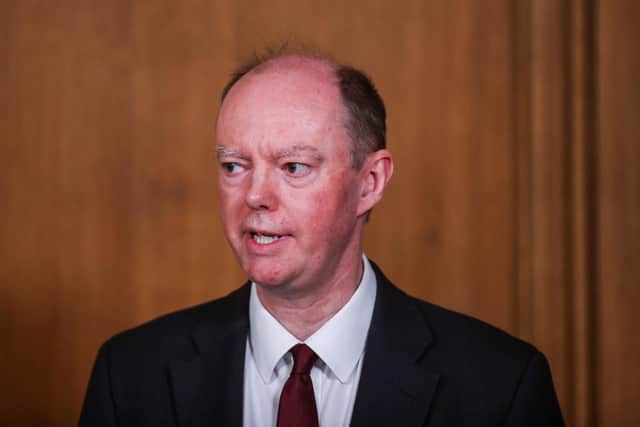Chance of 'eradicating' coronavirus across the globe is 'close to zero' warns Chris Whitty
and live on Freeview channel 276
Speaking at a 10 Downing Street press conference, Prof Whitty said that only one disease – smallpox – has ever been successfully eradicated from Earth and that Covid-19 was unlikely to be any different, meaning it will remain a threat for the ‘foreseeable future’.
Prof Whitty said: ‘I regret to say that I think the chances of eradicating this disease - which means getting rid of it absolutely everywhere - are as close to zero as makes no difference.
Advertisement
Hide AdAdvertisement
Hide Ad‘In terms of eliminating from the UK, this is a disease which has got, for most people who have it, mild symptoms or in some cases no symptoms. That makes it very difficult to find.’


The government’s chief scientific adviser Sir Patrick Vallance agreed and said: ‘Don’t expect that this is going to disappear. Expect that there will be recurrences of infections, particularly in winter, and this will become a circulating virus, as others have done over thousands of years.
‘Unfortunately, the chances of eradication, true eradication - ie zero - are in themselves very close to zero.’
The impact of the pandemic on other aspects of the health service ‘will have some delayed effect’. Prof Whitty added.
Advertisement
Hide AdAdvertisement
Hide Ad‘There will be people for example who’ve probably delayed having screening and I would really encourage people to take that up for things like cervical cancer, breast cancer, which run the risk of people having a delayed diagnosis.
‘The same will be true for people who’ve not gone for routine or elective care, who normally would,’ he said.
Prof Whitty said another issue is that ‘much of what’s happened in lockdown has the risk of making people who are on the borderlines of deprivation in more difficult economic and other circumstances and we all know that has a massive impact on long-term health implications’.
A message from the Editor, Mark Waldron
The News is more reliant than ever on you taking out a digital subscription to support our journalism.
You can subscribe here for unlimited access to Portsmouth news online - as well as our new Puzzles section.
Comment Guidelines
National World encourages reader discussion on our stories. User feedback, insights and back-and-forth exchanges add a rich layer of context to reporting. Please review our Community Guidelines before commenting.